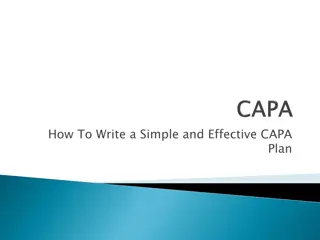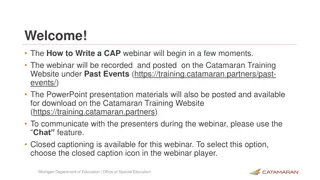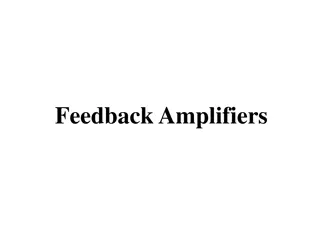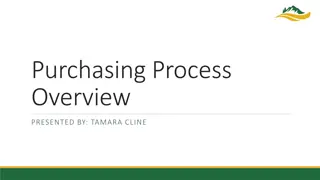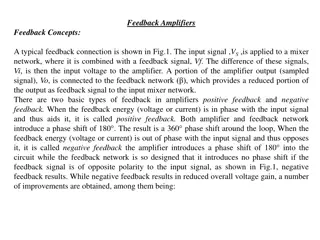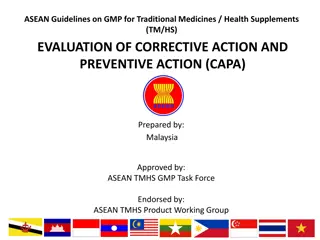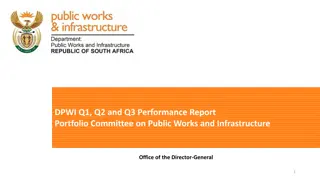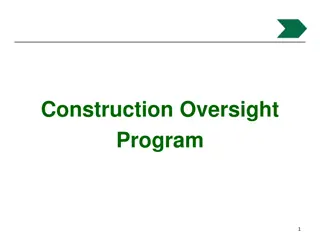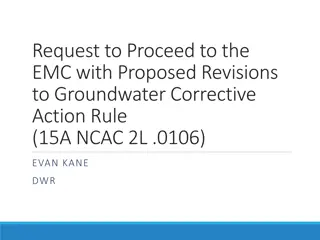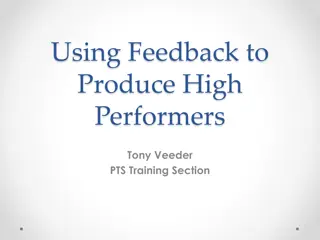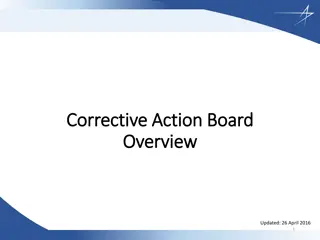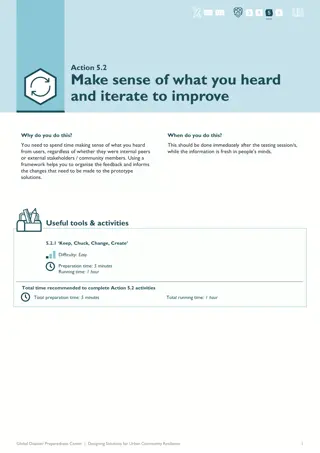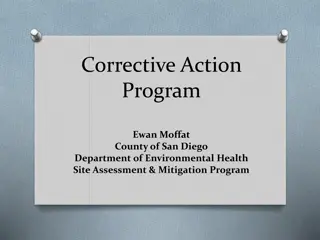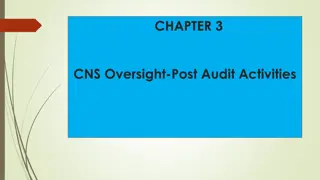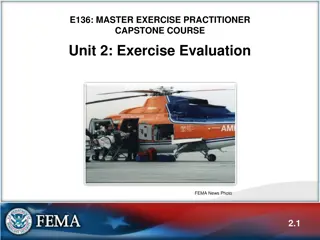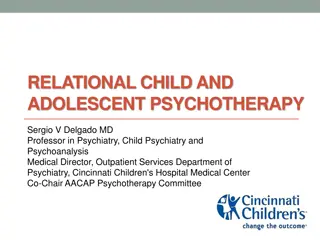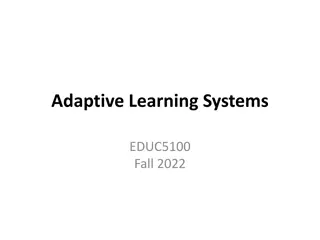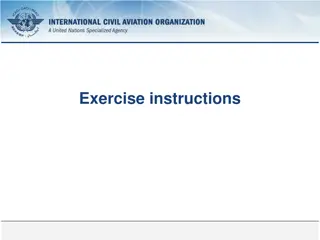DOELAP Assessor Training Corrective Actions
This content provides an overview of the DOELAP Assessor Training and Corrective Actions process, including roles, responsibilities, post-assessment actions, applicant responses to findings, and actions at the concern level. It covers how corrective actions are developed, reviewed, and implemented,
4 views • 42 slides
Financial Oversight and Corrective Actions in Transit Administration
Financial oversight and corrective actions play a crucial role in ensuring compliance and efficiency in transit administration. The Federal Transit Administration (FTA) Region 9's Office of Financial Management and Program Oversight works diligently to identify common deficiencies through triennial
0 views • 28 slides
Enhancing Student Learning Through Effective Feedback Strategies
Effective feedback plays a crucial role in improving student learning outcomes by providing specific information that students can use to enhance their performance. This content explores the importance of feedback, examples of good feedback practices, qualities of good feedback, and what components
5 views • 16 slides
Understanding Endodontic Mishaps in Root Canal Treatment
Endodontic mishaps or procedural accidents are unfortunate occurrences that can happen during root canal treatment, ranging from inattention to detail to unpredictable events. These mishaps can affect the prognosis and may require corrective measures. Classification of mishaps includes accidents dur
1 views • 62 slides
Animal Research Compliance and Reporting Overview
Tips to ensure compliance in animal research, reporting requirements, types of reportable incidents in 2020, animals involved, individuals responsible for issues, and institutional corrective actions taken. Understanding the cooperative process of reporting, corrective actions, and responsibilities
0 views • 21 slides
Creating an Effective Corrective and Preventive Action (CAPA) Plan
Effective CAPA plans are essential for addressing and preventing issues in various processes. This guide outlines the differences between CAP and CAPA, steps for developing a CAPA plan, implementing corrective and preventive actions, and encouraging continuous improvement through thorough documentat
0 views • 9 slides
How to Write a CAP Webinar Overview
The How to Write a Corrective Action Plan (CAP) webinar provides insights on different types of CAPs, the CAP workflow, and the role of districts and ISDs in implementing corrective actions. The presentation also covers the overview of CAP differences and data CAPs, emphasizing the importance of acc
0 views • 41 slides
Effective Feedback Strategies for Learning Enhancement
Feedback plays a crucial role in the learning process. This session focuses on strategies for providing effective feedback to improve learning outcomes, course, and assignment design, best practices, and tools for efficient feedback delivery. Understanding the importance of prompt feedback and diffe
3 views • 20 slides
Ensuring Protocol Compliance and Corrective Action Plans in Clinical Trials
This content discusses the importance of creating Corrective Action and Preventive Action (CAPA) plans for protocol deviations in clinical trials. It covers the components of a CAPA, best practices for creating CAPAs for different deviation types, and regulatory compliance requirements according to
0 views • 33 slides
Understanding Feedback Amplifiers: Structure, Properties, and Topologies
Electronic circuits rely heavily on feedback mechanisms, particularly negative feedback, for various purposes such as desensitizing gain, reducing distortion, controlling impedance, and improving amplifier bandwidth. This article explores the general structure of feedback, properties of negative fee
0 views • 68 slides
Enhancing Feedback Practices with Audio-Visual Technology: A Study on Student Satisfaction and Attainment
This presentation delves into the implementation of Audio-Visual Feedback (AVF) technology to improve assessment feedback practices in an educational institution. The study explores the impact of AVF on student satisfaction levels compared to traditional written feedback, as well as its influence on
0 views • 21 slides
High-Level Overview of Purchasing Process for Various Purchase Categories
This training presented by Tamara Cline offers a high-level explanation of the purchasing process for purchases exceeding $10,000, between $10,000 and $88,300, over $88,300, and public works. It covers process deviations resulting in audit findings and corrective action plans without detailed requis
0 views • 20 slides
Understanding the Importance of Feedback in Achievement Enhancement
Feedback plays a crucial role in encouraging or discouraging behavior, making it essential to provide constructive feedback that focuses on growth and improvement. Improper feedback can lead to incompetence in the workplace. Learn about the definition of feedback, how to give feedback effectively, a
2 views • 22 slides
Understanding Feedback Amplifiers in Electronic Circuits
Feedback amplifiers play a crucial role in electronic circuits by providing mechanisms for controlling gain, stability, and overall performance. There are two basic types of feedback - positive and negative, each offering distinct advantages. The four ways of connecting feedback signals involve volt
1 views • 18 slides
ASEAN Guidelines on GMP for Traditional Medicines: Evaluation of Corrective Action and Preventive Action
The ASEAN Guidelines on GMP for Traditional Medicines discuss the importance of Corrective Action and Preventive Action (CAPA) for maintaining quality in health supplements. CAPA involves identifying nonconformities, implementing solutions, and preventing future occurrences through continuous improv
1 views • 47 slides
Quarterly Performance Report Presentation to Portfolio Committee
This report presents the performance of the Department for the 1st, 2nd, and 3rd quarters to the Portfolio Committee on Public Works and Infrastructure. It includes non-financial and financial performance details, color coding guide, target achievements, performance averages, management performance
0 views • 43 slides
Construction Oversight Program: Roles, Reviews, and Corrective Actions
This program provides guidance and assistance in performing project reviews with local agency staff, conducting various types of reviews such as pre-construction, mid-project, and post-project reviews, and issuing corrective action plans for major deficiencies identified. Agencies are required to su
1 views • 13 slides
Enhancing Feedback Strategies in ELA Learning Project Day
Refine understanding of ELA, engage with student exemplars, and design constructive feedback in a structured agenda. Activities include generating feedback, digging deeper into feedback processes, and considering the impact of timely and specific feedback on student growth in learning and skills. Co
0 views • 31 slides
Effective Feedback Strategies for Resident Teachers
Effective feedback is critical for the growth of resident teachers. This guide covers types of feedback, why it's important, what makes feedback effective, behaviorally anchored rating scales, models for giving feedback, and key tips for delivering feedback successfully.
0 views • 14 slides
Proposed Revisions to Groundwater Corrective Action Rule for EMC Review
The document outlines proposed revisions to the Groundwater Corrective Action Rule (15A NCAC 2L.0106) for Environmental Management Commission (EMC) review. Recommendations include clarifying terminology, compliance boundaries, non-permitted activities, and permit types. Two draft rule options are pr
0 views • 9 slides
Effective Feedback Strategies for High Performance
Feedback plays a crucial role in helping individuals improve performance and reach their full potential. From providing helpful feedback to reinforcing desired behaviors, this guide explores various strategies, including redirection, reinforcement, and F.A.S.T. feedback, to enhance workplace perform
0 views • 21 slides
Enhancing Postgraduate Academic Writing: Feedback Collaboration Model
Developing a collaborative model for postgraduate academic writing courses involves understanding the role of feedback, focusing on content feedback, and exploring the intersections between discipline specialist and writing tutor feedback to improve academic writing abilities. Feedback offers valuab
1 views • 27 slides
Understanding Corrective Action Boards and Business Rhythms
Corrective Action Boards (CABs) are forums that support preventive and corrective actions to enhance service/product quality and customer satisfaction. Guidelines and purpose emphasize continuous improvement. Business Rhythms outline meeting structures for different organizational tiers to ensure ef
0 views • 28 slides
Iterative Feedback Framework for Prototype Improvement
The iterative feedback framework involves making sense of user feedback using the Keep, Chuck, Change, Create (KCCC) model to iterate and enhance prototype solutions. This process helps organize input from testing sessions, informing necessary modifications for better outcomes. The framework emphasi
1 views • 26 slides
San Diego Environmental Health Corrective Action Programs Overview
In the County of San Diego, the Department of Environmental Health oversees Corrective Action programs for permitted facilities. This includes the Corrective Action Designation, SAM Programs, exclusions from Corrective Action, and sources of Corrective Action cases. The program covers releases from
0 views • 12 slides
Understanding Mid-Course Feedback Using Qualtrics
Mid-Course Feedback (MCF) is a valuable process that allows students to provide feedback on their courses mid-semester, impacting teaching strategies, communication, materials, and more. This feedback benefits both students and instructors by improving teaching effectiveness, student satisfaction, a
0 views • 21 slides
Importance of Student and Staff Feedback in Educator Evaluation
Student and staff feedback plays a crucial role in educator evaluation, providing valuable insights into areas of strength and growth. Informed by evidence such as surveys, observations, and artifacts, feedback helps educators tailor their practice, fostering two-way communication and professional d
0 views • 14 slides
Post-Audit Activities in CNS Oversight: Overview and Procedures
The post-audit activities in CNS oversight involve completing administrative details, producing audit reports, evaluating corrective action plans, ensuring full plan implementation, and formal closure of audits. Audit teams conduct meetings, analyze data, validate observations, submit reports, archi
0 views • 29 slides
Exercise Evaluation Steps 7 and 8 Overview
In steps 7 and 8 of the Exercise Evaluation process, the focus is on finalizing the After-Action Report (AAR) and Improvement Plan (IP) and tracking the implementation progress. Step 7 involves consolidating corrective actions into the final IP to be included in the AAR appendix, while step 8 emphas
0 views • 12 slides
Understanding Cascade Control Systems in Industrial Processes
Cascade control systems play a crucial role in improving process control efficiency by incorporating feedback loops within feedback loops. This type of control architecture helps to better handle disturbances and variations in the process by creating secondary loops that monitor specific parameters.
0 views • 8 slides
Understanding Relational Child and Adolescent Psychotherapy
Explore the concepts of relational child and adolescent psychotherapy involving attachment patterns, intersubjectivity, corrective emotional experiences, and the role of the relational psychodynamic psychotherapist in providing corrective emotional experiences essential for the child's development.
0 views • 25 slides
IEEE 802.11-17/0044 NDP Short Feedback Design
The document discusses the need for short simultaneous feedback from multiple STAs in IEEE 802.11 systems for improved efficiency. It introduces the NDP feedback mechanism and proposes a signaling technique to efficiently collect feedback from a high number of STAs. The mechanism involves UL MU tran
0 views • 19 slides
AI Automation for Corrective Feedback in Language Learning
Exploring the utilization of AI technology to automate and enhance corrective feedback in language learning, addressing challenges such as time constraints, delayed feedback, and student comprehension. Introduction of a new AI text tool by Marcus Green for accessible and effective feedback provision
0 views • 13 slides
Enhancing Research Appointment Services at UMBC Library
UMBC subject librarians implemented a feedback survey to improve research appointment services. By analyzing feedback data, shared best practices were developed to ensure quality and consistency. The project timeline included identifying goals, drafting the timeline, creating the feedback form, and
0 views • 7 slides
Understanding the Importance of Feedback in Learning and Development
Feedback plays a crucial role in providing information about performance or behavior to affirm strengths and improve weaknesses. It helps individuals become consciously competent by identifying areas for improvement through formative assessment. Effective feedback enhances motivation, promotes learn
0 views • 33 slides
IEEE 802.11-19/0709r0 - Immediate and Delayed Feedback May 2019
The document discusses immediate and delayed feedback mechanisms in IEEE 802.11-19/0709r0, focusing on parameters, feedback types, and ranging options. It explores variations in feedback direction and types, proposing options for phase shift feedback and distinguishing between RSTA-to-ISTA and ISTA-
0 views • 6 slides
Product Feedback Forum at NWS: Provisional PS-PVR User Feedback on ABI, CMI, and L1b
A comprehensive feedback system managed by PRO at NWS, focusing on user input for GOES-R products such as ABI, CMI, and L1b. The forum gathers feedback through surveys and weekly calls, addressing product quality issues and ensuring effective communication with field sites. Noteworthy discussions in
0 views • 18 slides
Understanding Feedback in Learning Systems
Exploring the role of feedback in educational settings, this content delves into the concept of providing information to learners by various agents. It discusses the importance of feedback in guiding learning progress, highlighting examples of correctness feedback and correct answer feedback. The be
0 views • 66 slides
Team-Based Self-Assessment and Corrective Action Planning Exercise
Engage in a team-based exercise where groups will complete self-assessments and develop corrective action plans based on assigned Protocol Findings. Teams will present their findings to the group, fostering collaborative problem-solving and ensuring comprehensive analysis of key areas. The exercise
0 views • 5 slides
Feedback and Mentoring Workshop for HIV Researchers
Mentoring workshop for HIV researchers focusing on giving and receiving feedback, nurturing early career investigators, and working with faculty continuum. The workshop offers insights on feedback exercises, assumptions, and rhetorical questions about feedback. Participants are encouraged to reflect
0 views • 33 slides





